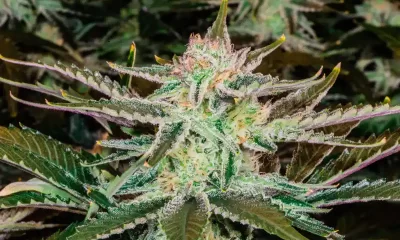Business
Michigan Considers Dropping Pre-Employment Cannabis Tests

Michigan voters legalized adult-use cannabis in 2018.
Policymakers in Michigan are considering major changes to the state’s drug testing policy, particularly as it pertains to cannabis use.
The potential changes come more than four years after voters there approved a ballot measure that legalized recreational pot use for adults aged 21 and older.
In a letter sent earlier this month to human resources officers, the state Civil Service Commission asked for public comment as it mulls various tweaks to the Michigan policy.
“Recent years have seen changes across the country in state laws regulating controlled substances. Michigan voters legalized marijuana’s medicinal use in 2008 and recreational use by adults in 2018,” read the letter, which was sent on May 12. “In light of these changes, commissioners have requested circulation for public comment of potential regulation amendments to end the pre-employment testing requirement for marijuana for classified employees hired into non-test-designated positions. Ending this pre-employment testing for marijuana would not affect the availability of reasonable-suspicion or follow-up testing for marijuana of classified employees, including candidates who become employees.”
The letter explains how in the late 1990s, “collective bargaining agreements added provisions allowing similar reasonable-suspicion, follow-up, random selection, and post-accident drug-testing of exclusively represented employees. Federal law also requires pre-employment and employee testing of some test-designated positions operating certain vehicles.”
“The 1998 rules directed the state personnel director to establish prohibited levels of drugs in regulations. Those regulations—and collective bargaining agreements—called for testing under procedures established under federal law. While the regulations technically allow agencies to request approval to test for any drug in schedule 1 or 2 of the state’s public health code, the default testing protocol used by the state since 1998 has tested for five classes of drugs: marijuana, cocaine, opiates, amphetamines, and phencyclidine,” the letter read.
The letter also noted that, since the new cannabis law took effect in December of 2018, “approximately 350 applicants for classified positions have tested positive for marijuana in pre-employment testing.”
Under the current Michigan rules, those applicants are precluded from applying for another job with the state for three years.
“While many of these sanctions have since lapsed, a few hundred remain in effect. The commission could adopt rule language allowing amnesty through rescission of continuing sanctions based on a pre-employment drug test for a non-test-designated position with a positive result for marijuana. Such action would not result in employment for these candidates but would allow them to apply for classified positions rather than waiting three years after being sanctioned,” the letter said.
As states have lifted their long standing prohibition on recreational pot use, lawmakers and regulators have recalibrated drug testing policies to bring them in line with the new cannabis laws.
Earlier this month, Washington Gov. Jay Inslee signed a bill into law that will enshrine protections for employees from getting tested for cannabis.
The legislation says that it is “unlawful for an employer to discriminate against a person in the initial hiring for employment if the discrimination is based upon: (a) The person’s use of cannabis off the job and away from the workplace; or (b) An employer-required drug screening test that has found the person to have non-psychoactive cannabis metabolites in their hair, blood, urine, or other bodily fluids.”
Professional sports leagues have similarly followed suit. A new collective bargaining agreement between the NBA and its players that was ironed out last month will remove cannabis from the list of banned substances. The new deal will also permit players to promote and invest in cannabis companies.
NBA Commissioner Adam Silver telegraphed the reform as far back as 2020.
“We decided that, given all the things that were happening in society, given all the pressures and stress that players were under, that we didn’t need to act as Big Brother right now,” Silver said then. “I think society’s views around marijuana [have] changed to a certain extent.”
Source: https://hightimes.com/news/michigan-considers-dropping-pre-employment-cannabis-tests/
Business
New Mexico cannabis operator fined, loses license for alleged BioTrack fraud

New Mexico regulators fined a cannabis operator nearly $300,000 and revoked its license after the company allegedly created fake reports in the state’s traceability software.
The New Mexico Cannabis Control Division (CCD) accused marijuana manufacturer and retailer Golden Roots of 11 violations, according to Albuquerque Business First.
Golden Roots operates the The Cannabis Revolution Dispensary.
The majority of the violations are related to the Albuquerque company’s improper use of BioTrack, which has been New Mexico’s track-and-trace vendor since 2015.
The CCD alleges Golden Roots reported marijuana production only two months after it had received its vertically integrated license, according to Albuquerque Business First.
Because cannabis takes longer than two months to be cultivated, the CCD was suspicious of the report.
After inspecting the company’s premises, the CCD alleged Golden Roots reported cultivation, transportation and sales in BioTrack but wasn’t able to provide officers who inspected the site evidence that the operator was cultivating cannabis.
In April, the CCD revoked Golden Roots’ license and issued a $10,000 fine, according to the news outlet.
The company requested a hearing, which the regulator scheduled for Sept. 1.
At the hearing, the CCD testified that the company’s dried-cannabis weights in BioTrack were suspicious because they didn’t seem to accurately reflect how much weight marijuana loses as it dries.
Company employees also poorly accounted for why they were making adjustments in the system of up to 24 pounds of cannabis, making comments such as “bad” or “mistake” in the software, Albuquerque Business First reported.
Golden Roots was fined $298,972.05 – the amount regulators allege the company made selling products that weren’t properly accounted for in BioTrack.
The CCD has been cracking down on cannabis operators accused of selling products procured from out-of-state or not grown legally:
- Regulators alleged in August that Albuquerque dispensary Sawmill Sweet Leaf sold out-of-state products and didn’t have a license for extraction.
- Paradise Exotics Distro lost its license in July after regulators alleged the company sold products made in California.
Golden Roots was the first alleged rulebreaker in New Mexico to be asked to pay a large fine.
Source: https://mjbizdaily.com/new-mexico-cannabis-operator-fined-loses-license-for-alleged-biotrack-fraud/
Business
Marijuana companies suing US attorney general in federal prohibition challenge

Four marijuana companies, including a multistate operator, have filed a lawsuit against U.S. Attorney General Merrick Garland in which they allege the federal MJ prohibition under the Controlled Substances Act is no longer constitutional.
According to the complaint, filed Thursday in U.S. District Court in Massachusetts, retailer Canna Provisions, Treevit delivery service CEO Gyasi Sellers, cultivator Wiseacre Farm and MSO Verano Holdings Corp. are all harmed by “the federal government’s unconstitutional ban on cultivating, manufacturing, distributing, or possessing intrastate marijuana.”
Verano is headquartered in Chicago but has operations in Massachusetts; the other three operators are based in Massachusetts.
The lawsuit seeks a ruling that the “Controlled Substances Act is unconstitutional as applied to the intrastate cultivation, manufacture, possession, and distribution of marijuana pursuant to state law.”
The companies want the case to go before the U.S. Supreme Court.
They hired prominent law firm Boies Schiller Flexner to represent them.
The New York-based firm’s principal is David Boies, whose former clients include Microsoft, former presidential candidate Al Gore and Elizabeth Holmes’ disgraced startup Theranos.
Similar challenges to the federal Controlled Substances Act (CSA) have failed.
One such challenge led to a landmark Supreme Court decision in 2005.
In Gonzalez vs. Raich, the highest court in the United States ruled in a 6-3 decision that the commerce clause of the U.S. Constitution gave Congress the power to outlaw marijuana federally, even though state laws allow the cultivation and sale of cannabis.
In the 18 years since that ruling, 23 states and the District of Columbia have legalized adult-use marijuana and the federal government has allowed a multibillion-dollar cannabis industry to thrive.
Since both Congress and the U.S. Department of Justice, currently headed by Garland, have declined to intervene in state-licensed marijuana markets, the key facts that led to the Supreme Court’s 2005 ruling “no longer apply,” Boies said in a statement Thursday.
“The Supreme Court has since made clear that the federal government lacks the authority to regulate purely intrastate commerce,” Boies said.
“Moreover, the facts on which those precedents are based are no longer true.”
Verano President Darren Weiss said in a statement the company is “prepared to bring this case all the way to the Supreme Court in order to align federal law with how Congress has acted for years.”
While the Biden administration’s push to reschedule marijuana would help solve marijuana operators’ federal tax woes, neither rescheduling nor modest Congressional reforms such as the SAFER Banking Act “solve the fundamental issue,” Weiss added.
“The application of the CSA to lawful state-run cannabis business is an unconstitutional overreach on state sovereignty that has led to decades of harm, failed businesses, lost jobs, and unsafe working conditions.”
Business
Alabama to make another attempt Dec. 1 to award medical cannabis licenses

Alabama regulators are targeting Dec. 1 to award the first batch of medical cannabis business licenses after the agency’s first two attempts were scrapped because of scoring errors and litigation.
The first licenses will be awarded to individual cultivators, delivery providers, processors, dispensaries and state testing labs, according to the Alabama Medical Cannabis Commission (AMCC).
Then, on Dec. 12, the AMCC will award licenses for vertically integrated operations, a designation set primarily for multistate operators.
Licenses are expected to be handed out 28 days after they have been awarded, so MMJ production could begin in early January, according to the Alabama Daily News.
That means MMJ products could be available for patients around early March, an AMCC spokesperson told the media outlet.
Regulators initially awarded 21 business licenses in June, only to void them after applicants alleged inconsistencies with how the applications were scored.
Then, in August, the state awarded 24 different licenses – 19 went to June recipients – only to reverse themselves again and scratch those licenses after spurned applicants filed lawsuits.
A state judge dismissed a lawsuit filed by Chicago-based MSO Verano Holdings Corp., but another lawsuit is pending.
Source: https://mjbizdaily.com/alabama-plans-to-award-medical-cannabis-licenses-dec-1/
-

 Business2 years ago
Business2 years agoPot Odor Does Not Justify Probable Cause for Vehicle Searches, Minnesota Court Affirms
-

 Business2 years ago
Business2 years agoNew Mexico cannabis operator fined, loses license for alleged BioTrack fraud
-

 Business2 years ago
Business2 years agoAlabama to make another attempt Dec. 1 to award medical cannabis licenses
-

 Business2 years ago
Business2 years agoWashington State Pays Out $9.4 Million in Refunds Relating to Drug Convictions
-

 Business2 years ago
Business2 years agoMarijuana companies suing US attorney general in federal prohibition challenge
-

 Business2 years ago
Business2 years agoLegal Marijuana Handed A Nothing Burger From NY State
-

 Business2 years ago
Business2 years agoCan Cannabis Help Seasonal Depression
-

 Blogs2 years ago
Blogs2 years agoCannabis Art Is Flourishing On Etsy













